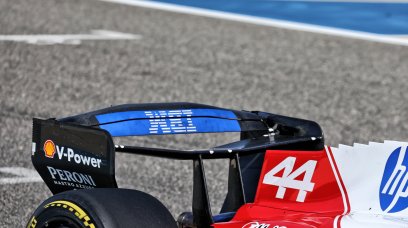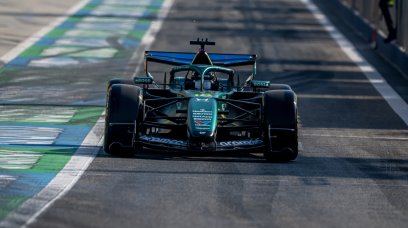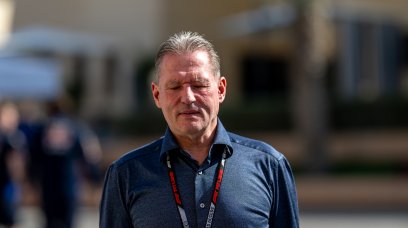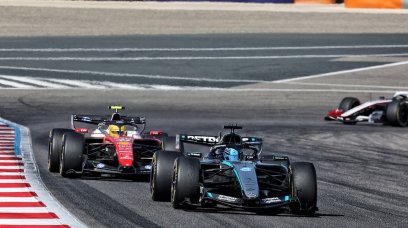F1 has announced it is on track to reach its target of becoming carbon net zero by 2030, through reducing its carbon footprint by 50 percent.
The championship has confirmed that as of the end of 2024, its carbon emissions were 26 percent down on its 2018 baseline, meaning it was over halfway to delivering on its aim by the halfway stage of the initiative.
Data collected by the series as part of its 2025 Sustainability Update shows that without action, its carbon footprint would have risen 10 percent between 2018 and last season, underlining a 36 percent reduction comparatively.
Over that period, the F1 calendar has grown from 21 to 24 rounds and the championship has significantly increased in popularity. Race attendance has expanded from 4 million to 6.5 million in that span, and Formula 1 now has a global fanbase of over 826 million.
To achieve its commitment by 2030, F1 will offset any unavoidable emissions through carbon credit programmes to reach its net zero target using best practice guidelines at the time.
When asked by RacingNews365 how F1 plans to address potential diminishing returns as 2030 nears, and what the strategy to counter that is, Ellen Jones, head of ESG (Environmental, Social and Governance) at Formula 1, explained how the championship is focused on the principle of "continuous improvement" and developing new solutions.
"You have to continue to innovate and to have the right personnel who are engaged in the topic to deliver," Jones explained to select media.
"So when we talk about net zero by 2030 its intention when it was set in 2018 was to activate our sport into climate action - and we see that in the actions that transfer to the report that we're issuing, but we also see that in a much broader scale, outside of the boundaries that was were set in 2018, and the reason for that is because our sport and our capabilities have matured. We're much more carbon literate.
"We are on track to deliver it, and the foundations are in place so that we can scale solutions like sustainable aviation fuel (SAF), we can scale solutions like shared facilities within the paddock.
"But equally, there's more to do outside which we work on day in, day out, whether it's with our promoters or the teams, and so for net zero by 2030, there will be emissions by 2030 that we cannot reduce or abate.
"And then for that part of the equation, that's when net comes in... when you balance the emissions that you reduce and that you offset.
"So when we get to that portion after we have taken through the maximum reductions for these areas, we will look at what is the latest science and guidance with that same rigour to understand the second portion of that equation.
"But, and I think this is a really important thing, is look at climate science. What we must do before 2030 is maximize reductions: change how we operate, change what the technological future looks like.
"And that is where F1 is delivering in our operations, but also focused on delivering in terms of what new solutions could look like."
Viewed by others:
What F1 will do after 2030
F1 highlighted that the 50 percent reduction is a minimum target and that 2030 is not an arbitrary or finite deadline; it will strive to further reduce emissions and increase sustainability beyond that point.
"I often get asked: 'What are you going to do after 2030?', Jones said. "And we're going to set the next target, the next areas that we have to deliver against, and apply the same rigour.
"For us, focusing on what we can do now is critical to ensure that you see the actions that you're seeing in this report.
"It's not something that we're looking to do in 20 years. It's 'what are we delivering in 2026, what have we done in 2025, what are we doing in 2027?', and that tight timeline means that we're focused on what reductions are possible and celebrating them."
What F1 has delivered since 2018
- Significant investment in sustainable aviation fuels (SAF), which has led to a 19% reduction in related emissions
- Investment in its remote broadcast operations from its media and technology centre in the UK, meaning approximately 140 personnel can work remotely at each grand prix weekend
- F1, alongside numerous teams and suppliers, has transformed its factories and facilities to transition to using more alternative energy sources, leading to a 59% reduction in associated carbon emissions
- 80% of race promoters power aspects of the events using alternative energy sources, including solar panels, green tariffs and biofuels
- F1 pointed out that "the delivery of innovative low-carbon energy generation systems using renewable sources such as hydrotreated vegetable oil (HVO), biofuel, solar panels, and battery. Following a trial at one grand prix in 2023, the system was expanded to three races in 2024. From 2025, the programme has been rolled out to reduce more than 90% of event-energy emissions at all European grands prix"
- F1 has introduced a fleet of biofueled trucks which reduce related carbon emissions by an average of 83% for the European portion of the season
- According to the report: "In 2024, improvements were made to the geographical flow of races around the world. This included moving the Japanese Grand Prix from September to April to align with the Asia-Pacific segment of the calendar; adjusting the Azerbaijan Grand Prix to align with Singapore; and scheduling the Qatar Grand Prix to run back-to-back with nearby Abu Dhabi. From 2026, the Canadian Grand Prix will be held in May, while the Monaco Grand Prix will move to June. This change consolidates the European leg of the F1 season into a single period, eliminating an additional transatlantic crossing for vital freight and equipment and delivering significant associated carbon reductions"
- Also highlighted was that: "In 2024, F2 and F3 cars ran on 55% advanced sustainable fuel blend, and the FIA medical and safety cars operated with a 40% blend. In 2025, the F2 and F3 cars moved to be fully powered by advanced sustainable fuel, in preparation for Formula 1 to be fuelled entirely by advanced sustainable fuel in 2026"
Also interesting:
Join RacingNews365's Ian Parkes, Sam Coop and Nick Golding, as they look ahead to this weekend's F1 Belgian Grand Prix. Red Bull's new chapter is a major talking point following the arrival of Laurent Mekies, as is the fight for the drivers' title.
Rather watch the podcast? Then click here
Don't miss out on any of the Formula 1 action thanks to this handy 2026 F1 calendar that can be easily loaded into your smartphone or PC.
Download the calenderMost read
In this article














Join the conversation!